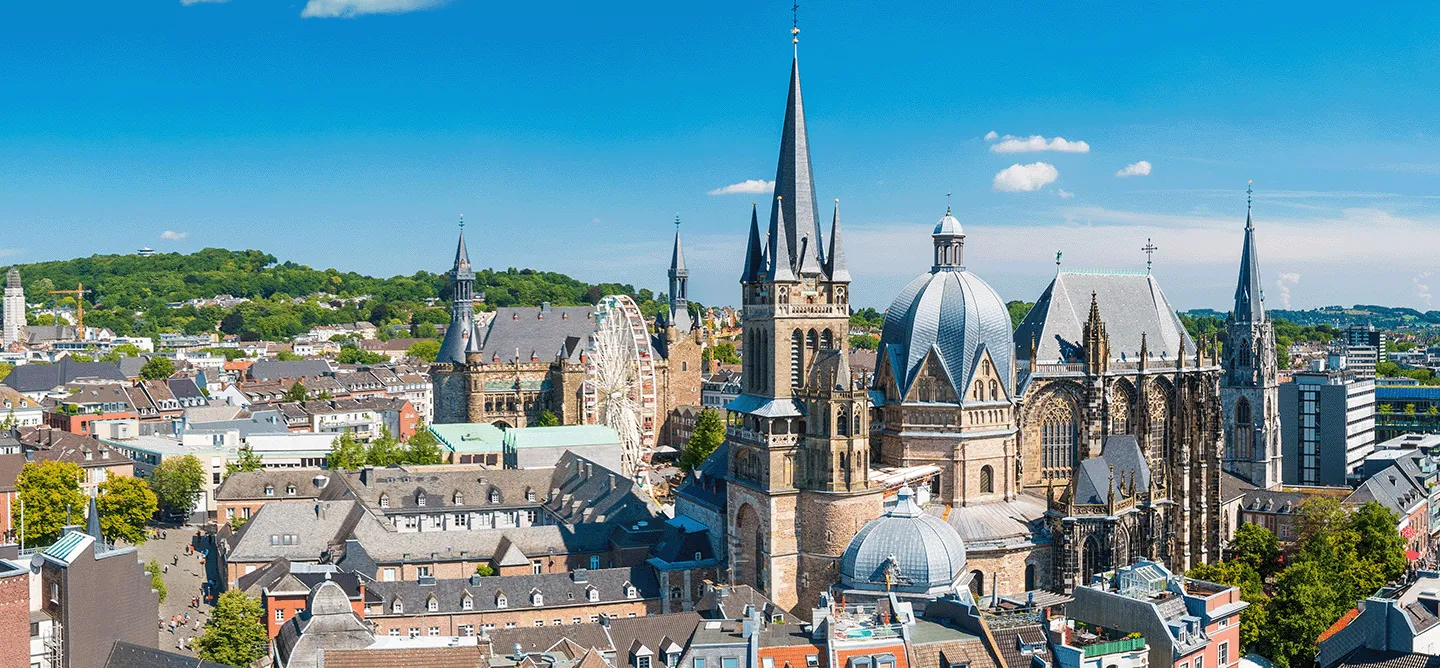Your master's degree in Germany
Practice-Oriented, International, and Career-Focused – find the Master’s Programme that suits you.

Your English-taught Master Programmes in Germany at CBS
A Master’s degree at CBS University of Applied Sciences is more than just advanced academic education - it is a practice-oriented and career-focused qualification with excellent professional prospects. Choosing a specialised Master’s programme allows you to deepen your expertise and qualify for leadership roles or specialised positions. With a wide range of specialisations and the option to study in German or English, you can tailor your degree to your interests and career aspirations.
Regardless of your professional background, our English Master programmes in Germany are designed to help you advance in your field and open up new career opportunities. Our Master’s programmes prepare you for the dynamic demands of the modern job market, providing you with the skills and expertise needed to succeed.
Take the opportunity to shape your future with us!

Find the Right Master’s Programme in Germany for You
Are you looking for a n English-taught Master’s programmein Germany that adapts to your lifestyle and career ambitions? Browse through our range of Master’s degrees and find the perfect programme for you.

Flexible Study Models – Full-Time, Dual, or Part-Time
At CBS University of Applied Sciences, we offer flexible study models that adapt to your life and career goals. Whether you choose a full-time, dual, or part-time programme, you can find the model that works best for you.
Get your free Broschure!
Are you interested in studying for a master's degree and would like to find out more? In our free information material, you will find all important details about Study content, career opportunities and Admission requirements. Get all the information now and get started!

FAQs about Master's degree programmes — Everything you need to know!
Are you interested in studying for a master's degree, but do you still have unanswered questions? Here you'll find answers to the most important questions — from content to requirements. Find out which Master's degree programmes suit you and what to expect during your studies!
What is a master's degree?
A Master’s degree is an advanced academic qualification that builds on a Bachelor’s degree, allowing for specialisation and in-depth expertise in a particular field. The programme typically lasts two to four semesters and concludes with a Master of Arts (M.A.), Master of Science (M.Sc.), or another specialised qualification. A Master’s degree prepares graduates for higher-level positions, research careers, or a PhD.
How is a master’s degree structured?
A Master’s degree begins with a specialisation phase, expanding on Bachelor-level knowledge and allowing students to develop advanced skills. Students complete core modules in their field, often supplemented by interdisciplinary or research-oriented content. Depending on the programme, practical projects, case studies, or internships may be included.
Courses include seminars, group work, and independent research. In the final semester, students write a Master’s thesis, which involves independent academic research. Graduates receive their Master’s degree upon successful completion, enabling access to high-level positions or doctoral studies.
How long does a master’s degree take?
A Master’s degree at CBS University of Applied Sciences typically takes four semesters (two years). However, the duration depends on the study model—full-time programmes can be completed faster, whereas part-time or executive Master’s programmes may take longer due to their flexible structure.
What career opportunities does a master’s degree offer?
A Master’s degree from CBS opens the door to diverse career opportunities. Graduates can specialise in their field of expertise, move into leadership roles, or expand their qualifications for international career prospects. CBS’s practice-oriented approach and strong career support ensure a smooth transition into employment or career advancement.
Are CBS master’s degrees officially recognised?
Yes! Every Master’s programme at CBS is state-recognised and accredited. CBS also holds institutional accreditation from the German Science Council, and all programmes undergo regular quality reviews by accreditation bodies.
Can I Enrol in a Master’s programme with a non-business bachelor's degree?
Many Master’s programmes at CBS are non-consecutive, meaning you do not necessarily need a business-related undergraduate degree. Interdisciplinary programmes such as M.A. Pedagogy & Adult Education or M.Sc. Sustainability Management allow graduates from diverse fields to transition into new areas. For specific entry requirements, our admissions team is happy to advise you.
What salary can I expect after completing a Master’s degree?
Salaries after a Master’s degree vary depending on industry, field of study, and work experience. In many sectors, a Master’s qualification leads to higher starting salaries compared to a Bachelor’s degree.
In Germany, average starting salaries for Master’s graduates range from €45,000 to €60,000 per year, with business and technical fields offering higher salaries than creative or social industries. With growing work experience, earning potential significantly increases.
Find your perfect Study location for your master's degre
Discover the diverse CBS University of Applied Sciences, with campuses across Germany.
Whether you prefer the vibrancy of a big city or a more regional setting, find the campus that suits you best.
Each location offers a modern campus experience, innovative learning spaces, and exciting career opportunities. Choose the place that aligns with your goals and start your journey towards a successful future.
Your Master’s degree – exactly where you want to grow.


















































.png)

























